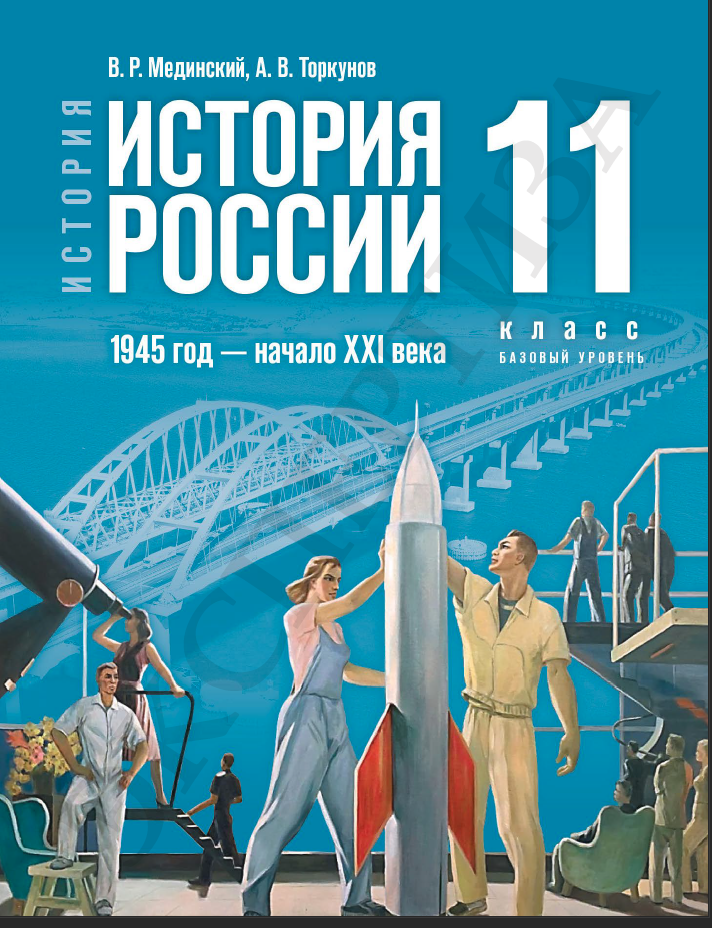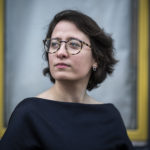When I was in middle school I loved history: ancient Egypt, ancient Greece, the Middle Ages always fascinated me. Often during the summer vacation, I would read the history books in advance to prepare for the upcoming history classes (big surprise, I am a nerd). Old habits die hard, so this summer I picked up – actually, clicked on – the updated version of the Russian history book for high-schoolers “Russian history 1945 – beginning of 21st century”. This version is co-written by the former culture minister and current aide to President Putin Vladimir Medinsky and the rector of MGIMO-University Anatoly Torkunov. This is a big reversal from the time when professional historians used to write these types of books. Now, I realise that I was lucky that I had to study the Leonid Katsva version of 2002, the subsequent variants were already getting worse. I am not a professional historian, just a discourse scholar with endless amount of snark, so here are my first impressions.

But let’s judge the book by its cover. What you can see is a Soviet-era painting of Aleksandr Deineka “The conquerors of space” superimposed on the image of the bridge to Crimea built after the annexation in 2014. The workers in the background are looking at it instead of the rocket launch in the original. An auspicious start, propaganda-wise, especially given Putin’s constant abuse of decolonization rhetoric and, of course, the missile phallic worship. Once you open the textbook, the abstract already tells you what it intends to do:
The main result of the study course should be the formation of Russian civic identity and patriotism among students.
Medinsky, Torkunov 2023
Silly me, I thought learning history was about something else, but I guess the authors were just being honest about what they are setting out to do. I should also mention here that Medinsky is infamous for authoring a series of garbage history books about Russian history, where he openly states that he does not care about facts. So, for him it’s par for the course.
The introduction continues in the same vein:
The most important event in recent history was the entry, or rather, the return of our historical lands to the Federation. There is no doubt that the Western challenge will make our country stronger, and the multinational Russian
people are even more united.You, the heirs of the glory of our fathers and grandfathers, will have to multiply the glory and strength of our Motherland. And let the history of Russia provide you with firm support and help you succeed!
Medinsky, Torkunov 2023
If you think that starting the timeline with 1945 will avoid references to the dear leader, you would be mistaken. The second quote preceding the first chapter is the notorious “collapse of the Soviet Union was the greatest geopolitical catastrophe of the 20th century” from 2005. I have to admit, my students study that speech as well but for very different reasons. They also provide a much more critical analysis of it than the authors with PhDs, but I digress.
Of course, knowing the Russian government’s obsession with World War II and its attempts to frame the war against Ukraine in these terms, it’s not surprising that Ukraine would make an appearance early on in the textbook, but the literal first page of text was ahead of schedule even for my tempered expectations. After stating that post-war round of repressions “were very much understood in the society”, the authors jump right in and go for “Baltic and Ukrainian Nazi collaborators”. The deportation of several ethnic groups during the war is mentioned in passing, only Crimean Tatars are named as well as “Northern Caucasian folk groups etc”. I guess Kalmyks, Ingush, Chechens, Karachays, Balkars, Nogais, Meskhetian Turks, Pontic Greeks, Bulgarians, Crimean Roma and Kurds did not fit into the word count. Historians estimate that 61 (ethnic) groups were partially and completely deported during the war, but I guess that fact is definitely irrelevant to the fact-lover Medinsky. Most of these kinds of facts he considers a Western smear against Russia anyway.
Banderovites (Ukraine) and forest brothers (Baltics) come back on page 11 lest the pupils forget, but let us turn to “postwar political system”. Stalin’s toast “for the [ethnic] Russian people” is featured in bold on page 24 as well as the fact that “national regions received immense financial support from the Union budget”. The last one is a rebuke for all those “ungrateful” former Soviet republics who apparently did not enjoy their colonisation and were happy when it ended.
I will skip the ideology chapter because I facepalmed a bruise on my face while reading it and turn to “USSR’s role in postwar world. Foreign policy 1945-1953”, it’s an IR blog after all. The main question of the chapter is “whether the Cold War was inevitable?” and the first page of the chapter hits you over the head with public opinion polls in France that show a sharp increase in the public perception of American contribution to the WWII effort at the expense of USSR’s. Knowing Medinsky’s historical “credentials” it is supposed to illustrate that in the West people are forgetting who won the war and giving the US an unearned credit for it. In bold are references that the US developed “nuclear attack plans on USSR” in 1945. The creation of NATO is emphasised as well as the fact that it was apparently only Soviet Union that wanted a neutral Germany, everybody else wanted it “to go back to 19th century”.
To be continued…


0 Comments